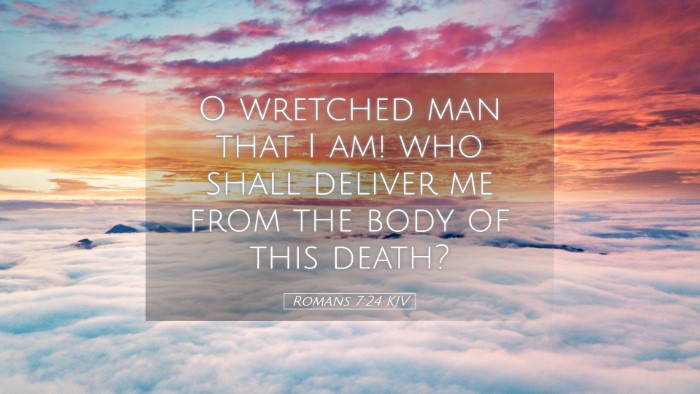Old Testament
Genesis Exodus Leviticus Numbers Deuteronomy Joshua Judges Ruth 1 Samuel 2 Samuel 1 Kings 2 Kings 1 Chronicles 2 Chronicles Ezra Nehemiah Esther Job Psalms Proverbs Ecclesiastes Song of Solomon Isaiah Jeremiah Lamentations Ezekiel Daniel Hosea Joel Amos Obadiah Jonah Micah Nahum Habakkuk Zephaniah Haggai Zechariah MalachiRomans 7:24
Romans 7:24 KJV
O wretched man that I am! who shall deliver me from the body of this death?
Romans 7:24 Bible Commentary
Commentary on Romans 7:24
Verse: Romans 7:24 – "O wretched man that I am! who shall deliver me from the body of this death?"
Introduction
This verse encapsulates a profound struggle with sin and the human condition as articulated by the Apostle Paul. It expresses a cry of despair and desperation for deliverance, reflecting the internal conflict faced by believers. This commentary synthesizes insights from prominent public domain commentaries, offering a comprehensive exploration of the themes within this poignant proclamation.
Spirit of Desperation
Matthew Henry emphasizes the depth of the Apostle’s anguish. Paul’s use of the phrase "O wretched man that I am!" reveals a stark self-awareness and acknowledgment of his unworthiness. This cry denotes not just a rhetorical flourish but a genuine lament that captures the struggle found in the life of every believer.
Henry highlights that Paul, having extensively discussed the law and the nature of sin, reaches a breaking point. The law exposes sin but offers no means of salvation; thus, Paul feels trapped, indicating that knowledge of the law does not equate to the ability to fulfill it. This lamentation is not unique to Paul but resonates with many who strive to live righteously yet are continually beset by their own fleshly desires.
The Body of This Death
Albert Barnes elucidates the phrase "the body of this death," interpreting it as a metaphorical representation of the mortal body that is inclined to sin and ultimately to death. He draws on cultural references, noting that in ancient times, a method of punishment involved tying a deceased body to the condemned man as a means of torturous humiliation. This, Barnes argues, is reflective of sin's grip on the believer. Just as the body of death would cling to the living man, so too does sin cling to the life of the believer, leading to spiritual decay.
This understanding broadens the interpretation of Paul's lament to encompass the weightiness of sin as a pervasive force in human life. Barnes urges readers to grasp the gravity of the struggle against sin and suggests that acknowledging this plight is fundamental to a deeper understanding of the need for grace and redemption.
Deliverance through Christ
Adam Clarke provides an analysis that pivots toward hope. While Paul’s cry of wretchedness speaks to despair, Clarke asserts that it simultaneously opens the door to the recognition of deliverance through Christ. He posits that the acknowledgment of one's wretchedness and inability is the first step toward receiving the grace that is found in Jesus Christ. Clarke draws attention to the theological principle that true freedom from sin can only be realized through faith in Christ, reinforcing the notion that Paul’s cry is ultimately a precursor to a divine answer.
The deliverance mentioned is not merely a release from the consequences of sin but also a liberation from sin's power. Clarke notes that through Christ, believers are equipped to navigate the life of righteousness amidst the ongoing battle against sin. Therefore, while the wretchedness of sin is real, so too is the hope that is found in the power of the Holy Spirit.
The Role of the Law
The commentary from Henry, Barnes, and Clarke converges on the understanding of the law’s role in the life of the believer. The law, as Paul details in previous verses, serves to define sin, revealing human incapacity to attain righteousness through efforts alone. This realization brings forth a sense of conflict and distress, as believers grapple with their moral failures.
Paul's struggle illustrates the tension between the knowledge of what is right and the power to execute that righteousness. As noted by Barnes, the law is good and holy, yet it reveals the sin that corrupts; this dynamic is at the heart of Paul's despair. Thus, the acknowledgment of wretchedness leads to the recognition of grace through Christ as the only resolution.
Application for Believers
The themes in Romans 7:24 resonate deeply with the experiences of many believers today. The struggle against sin is a universal experience that often leads to feelings of defeat and helplessness. Yet, it is essential to remember that Paul's exploration of despair is framed within the bounds of hope. The wretchedness acknowledges the need for a Savior, pointing to the reality that divine deliverance is available.
- Self-awareness: Understanding one’s own vulnerabilities is crucial for spiritual growth.
- Dependence on Grace: Believers are encouraged to turn to Christ, recognizing that human efforts are insufficient for salvation.
- Hope in Deliverance: The acknowledgment of struggle should lead to an anticipation of divine aid, for Christ comes to rescue the wretched.
Conclusion
This verse encapsulates the tension of the Christian experience—acknowledgment of wretchedness and the need for deliverance. Insights from Matthew Henry, Albert Barnes, and Adam Clarke illuminate not only the despair voiced by Paul but also the profound hope found in Jesus Christ. As pastors, students, theologians, and scholars reflect on Romans 7:24, may they find encouragement in the truth that while sin may bind, grace abounds, paving the way to true freedom and righteousness.


